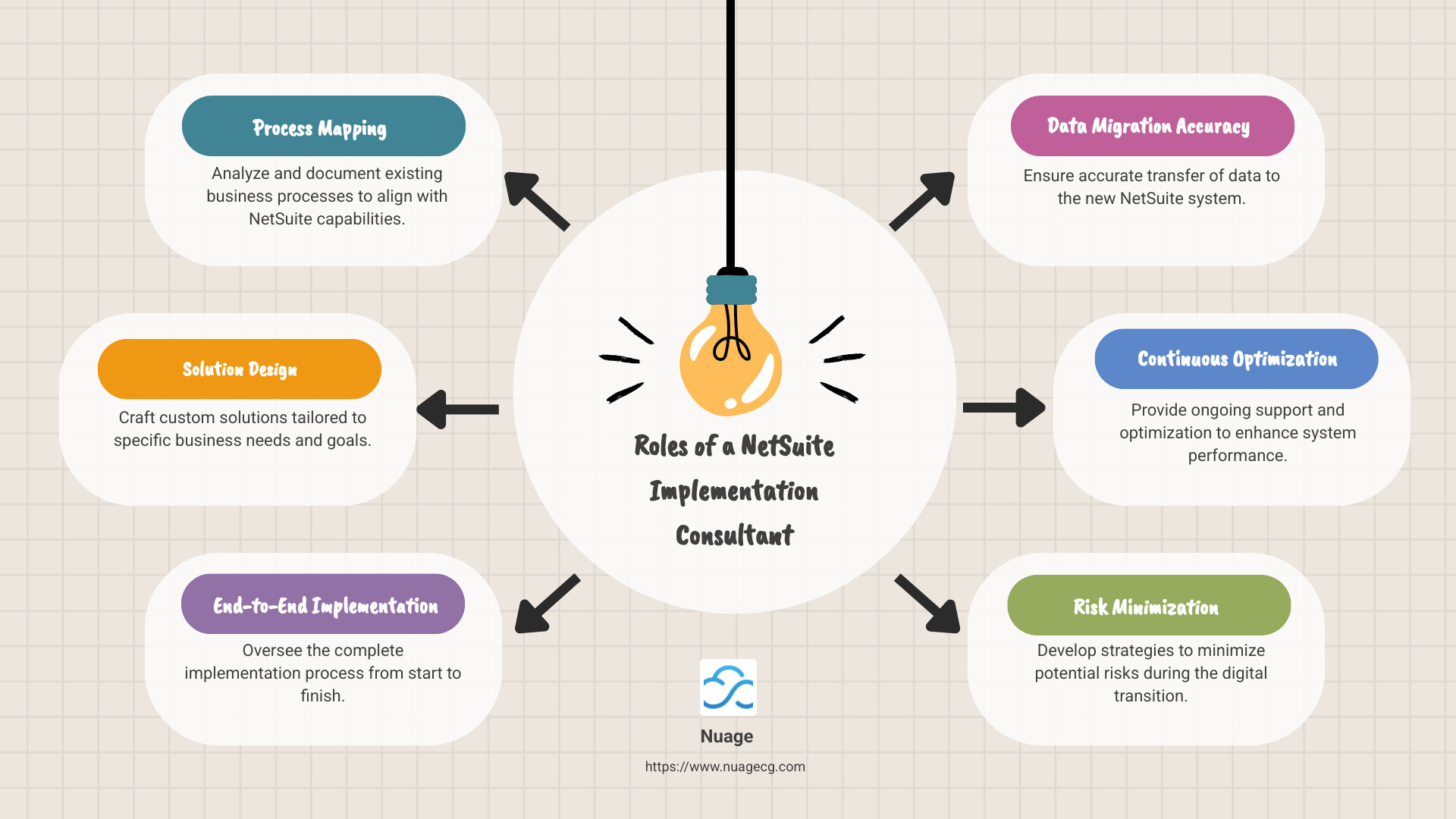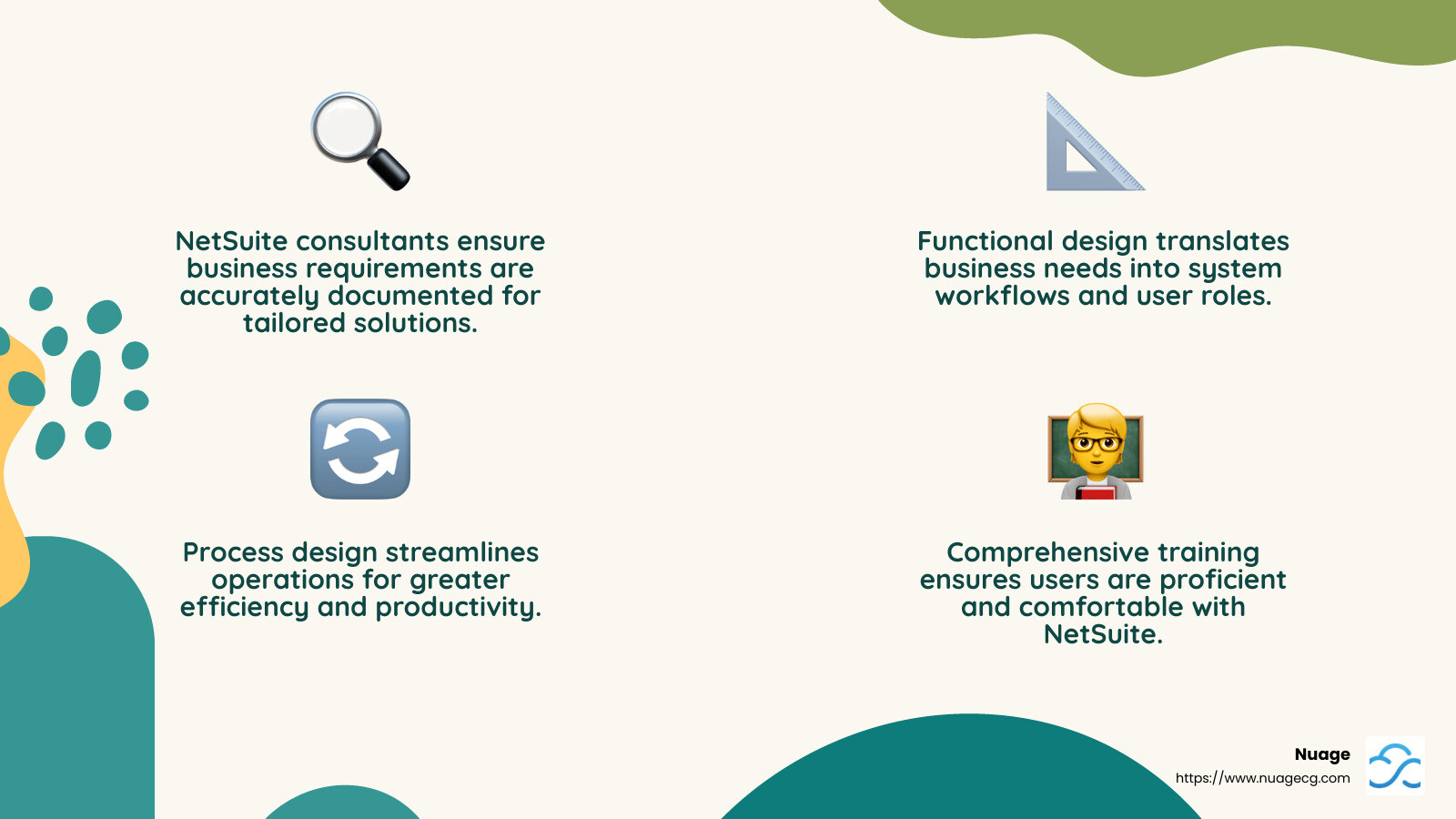NetSuite Implementation Consultant: Top Guide for 2025 Success
NetSuite implementation consultant roles are pivotal in navigating the complex landscape of digital change within ERP businesses.
Key roles include:
- Mapping existing business processes
- Designing custom solutions
- Leading end-to-end implementations
- Ensuring data migration accuracy
- Providing continuous system optimization
In a rapidly evolving technological landscape, the shift to a digital-first approach is paramount for manufacturing businesses, especially those ready for growth and scalability. Embracing a robust Enterprise Resource Planning (ERP) system like NetSuite can greatly improve operational efficiency and adaptability. As the demand for streamlined processes and data-driven insights increases, NetSuite ERP emerges as an indispensable tool, powering digital change by integrating diverse business functions into one unified platform.
A key figure driving this change is the NetSuite implementation consultant. Skilled in aligning business strategies with technical solutions, these consultants ensure a seamless transition to digital operations, minimizing risks while maximizing performance.
I’m Louis Balla, a seasoned expert in ERP solutions with over 15 years of experience guiding businesses through digital changes. My focus on NetSuite implementation ensures that your business benefits from custom solutions that drive growth. Transitioning seamlessly, we dig deeper into understanding the integral role of NetSuite consultants in the next section.

Learn more about NetSuite
Explore solutions
Basic NetSuite implementation consultant terms:
Understanding the Role of a NetSuite Implementation Consultant
A NetSuite implementation consultant plays a crucial role in changing business operations through effective ERP integration. Their work ensures that the transition to NetSuite is smooth and aligns perfectly with a company’s unique needs.
Business Requirements
The first step in a successful NetSuite implementation is understanding and documenting the business requirements. This involves collaborating with stakeholders to gather insights into existing processes and identifying areas for improvement. By capturing these requirements, consultants ensure that the NetSuite solution is custom to meet specific business objectives and challenges.
Functional Design
Functional design is where creativity meets technical expertise. A consultant translates business requirements into a functional design that outlines how NetSuite will support business operations. This design includes workflows, interfaces, and user roles. It’s like crafting a blueprint for a building, ensuring every element fits perfectly into the overall structure.
Process Design
Process design focuses on optimizing workflows and operations. Consultants work closely with functional leads from departments like finance and supply chain to re-engineer processes for efficiency. This step isn’t just about digitizing existing workflows; it’s about enhancing them to open up greater productivity and operational effectiveness.
Testing
Testing is a critical phase where consultants ensure that the NetSuite system functions as intended. Through rigorous testing, they identify and resolve any issues before the system goes live. This phase includes unit testing, integration testing, and user acceptance testing, each designed to ensure the system meets all functional and technical requirements.
Training
Finally, training is essential to ensure end-users are comfortable and proficient with the new system. Consultants develop training programs that cater to different user roles, ensuring everyone understands how to use NetSuite effectively. This step is vital for smooth adoption and long-term success.

In summary, a NetSuite implementation consultant is integral in aligning business needs with technical solutions, ensuring a seamless transition to a digital-first approach. Their expertise in business requirements, functional design, process design, testing, and training is pivotal in driving successful ERP implementations.
Transitioning smoothly, we will now explore the key skills and qualifications needed to excel as a NetSuite implementation consultant.
Key Skills and Qualifications
To excel as a NetSuite implementation consultant, there are several key skills and qualifications you need. Let’s break them down:
Bachelor’s Degree
A bachelor’s degree is often the starting point for a career in NetSuite implementation. While degrees in fields like accounting, business, finance, computer science, or information systems are beneficial, the most important thing is to have a solid understanding of business processes and technology.
Consulting Experience
Consulting experience is invaluable. It equips you with the ability to understand diverse business environments and client needs. With at least three years of consulting under your belt, you’ll have honed skills in project management, client communication, and problem-solving, all of which are crucial for a successful NetSuite implementation.
NetSuite Experience
Experience with NetSuite itself is, of course, essential. Ideally, you should have at least two years of direct experience with NetSuite ERP implementations. This includes understanding its suite of business applications and how they can be custom to meet specific business needs. Familiarity with NetSuite’s features, from finance to CRM, helps you design solutions that align with client goals and optimize their operations.
NetSuite offers certifications that can bolster your expertise and credibility. Being a Certified NetSuite Professional can demonstrate your proficiency and commitment to mastering the platform.
Additional Skills
- Communication: Effective communication is key for collaborating with stakeholders and translating business needs into technical solutions.
- Analytical Thinking: Being able to analyze complex data and business processes to develop efficient solutions is crucial.
- Technical Aptitude: A good grasp of technology and the ability to learn new tools quickly will help you adapt to the evolving digital landscape.
In summary, a blend of education, consulting experience, and specialized NetSuite knowledge forms the foundation of a successful career as a NetSuite implementation consultant. These skills and qualifications ensure you can deliver custom ERP solutions that drive business success.
Steps to Becoming a NetSuite Implementation Consultant
Starting on a career as a NetSuite implementation consultant involves a few key steps. Let’s break down the essentials: certification, industry experience, and best practices.
Certification
Certification is a crucial step in demonstrating your expertise in NetSuite. As a prospective consultant, obtaining a Certified NetSuite Professional credential can set you apart. This certification validates your skills in using NetSuite’s suite of digital business applications. It shows clients that you have the know-how to implement solutions effectively.
Pro Tip: Start with the NetSuite SuiteFoundation Certification. It covers the basics and paves the way for more advanced certifications like the NetSuite ERP Consultant Certification.
Industry Experience
Experience in the field is invaluable. Working in industries that heavily rely on ERP systems, like finance, manufacturing, or retail, can give you the practical knowledge needed to address unique business challenges.
Case in Point: A retail company successfully aligned their team’s skills with business goals, leading to a more efficient NetSuite implementation and quicker ROI. Industry experience helps you understand the nuances of different business processes, making you a more effective consultant.
Best Practices
Adhering to best practices ensures that your implementations are smooth and successful. Here are some key practices:
-
Thorough Planning: Begin with a comprehensive analysis of business requirements. This includes mapping out processes and identifying potential challenges early on.
-
Iterative Approach: Implement changes in phases. This allows for continuous improvement and minimizes risks, as discussed in iterative ERP implementation strategies.
-
Effective Communication: Regular meetings and open channels for communication are vital. Use tools like Slack or Microsoft Teams to keep everyone in the loop.
-
User Training: Tailor training sessions to meet the needs of end-users. Effective training leads to better adoption and utilization of NetSuite features.
-
Feedback Loops: Encourage feedback from users to refine processes and improve the system continuously.
By following these steps and focusing on certification, gaining industry experience, and adhering to best practices, you can build a successful career as a NetSuite implementation consultant. These elements ensure you are well-equipped to deliver solutions that align with client goals and drive efficiency.
In the next section, we will explore the NetSuite implementation process, covering requirements management, prototyping, scenario design, and flow mapping.
The NetSuite Implementation Process
Implementing NetSuite is a journey that requires careful planning and execution. Let’s explore the key components of this process: requirements management, prototyping, scenario design, and flow mapping.
Requirements Management
The first step in a successful implementation is understanding what the business needs. Requirements management involves gathering detailed information about current systems, workflows, and key business processes. This is your chance to think about what you want to achieve with NetSuite and how it can improve your operations.
Key Tasks:
- Conduct interviews and workshops with stakeholders to gather requirements.
- Document current processes and identify areas for improvement.
- Prioritize requirements based on business needs and potential impact.
Example: A company might want to reduce financial close time or automate payroll integration. Clearly defining these goals helps guide the implementation.
Prototyping
Once requirements are clear, prototyping comes into play. This step involves creating a working model of the system to test ideas and validate requirements. Prototyping allows you to see how NetSuite can meet your needs before full-scale implementation.
Benefits:
- Identify potential issues early.
- Get feedback from users to refine the system.
- Ensure the solution aligns with business processes.
Tip: Use NetSuite’s built-in tools to create prototypes that reflect actual business scenarios.
Scenario Design
Scenario design is about mapping out how different business processes will work in NetSuite. It involves creating detailed scenarios that describe how users will interact with the system.
Steps:
- Define key scenarios based on typical business operations.
- Design workflows that optimize these scenarios.
- Use these scenarios to guide testing and training.
Real-World Insight: By designing scenarios, a manufacturing company was able to streamline its supply chain process, reducing lead times and improving efficiency.
Flow Mapping
Finally, flow mapping visualizes how different parts of the system connect and interact. This step ensures that all processes are aligned and that data flows seamlessly through the system.
Components of Flow Mapping:
- Visual diagrams of process flows.
- Identification of key touchpoints and integrations.
- Analysis of data flow to ensure consistency and accuracy.
Case Study: A retail business used flow mapping to integrate NetSuite with their CRM, ensuring a smooth customer journey from order to delivery.
By following these steps—requirements management, prototyping, scenario design, and flow mapping—you can steer the complexities of a NetSuite implementation with confidence. Each step is crucial in ensuring that the final solution not only meets the immediate needs but also sets the stage for future growth and scalability.
Next, we’ll tackle the common challenges faced during implementation and explore effective solutions.
Challenges and Solutions in NetSuite Implementation
Implementing NetSuite can bring transformative benefits, but it also comes with its challenges. Let’s explore three key areas: integration, data migration, and change management.
Integration
Challenge: Integrating NetSuite with existing systems is often a complex task. Businesses use various applications like CRM, eCommerce platforms, and supply chain systems. Ensuring these systems communicate effectively with NetSuite is crucial.
Solution: Use tools like SuiteCloud for seamless integration. SuiteCloud supports various integration technologies, such as SuiteTalk REST and SOAP Web Services, making it easier to connect NetSuite with other systems. Consider using pre-built connectors to simplify the process and reduce the need for custom coding. Always prioritize testing to ensure integrations work smoothly.
Real-World Insight: A retail company successfully integrated NetSuite with its CRM using SuiteCloud, enabling real-time data sharing and improving customer service.
Data Migration
Challenge: Data migration is a critical part of the implementation process. Ensuring data quality and integrity during migration is essential to avoid disruptions.
Solution: Start with a thorough data audit to identify and clean any inconsistencies. Use NetSuite’s CSV File Import tool for structured data migration. This tool offers a visual field-mapping assistant to ensure data is correctly mapped. Plan for multiple rounds of testing to catch and resolve any issues before going live.
Tip: Break down the migration process into smaller phases to manage complexity and reduce risks.
Change Management
Challenge: Change management is often underestimated. Employees may resist new systems, affecting adoption and productivity.
Solution: Engage stakeholders early in the process. Conduct training sessions to familiarize users with NetSuite’s functionalities. Create a clear communication plan to keep everyone informed about the changes and benefits. Leverage organizational change management strategies to address concerns and foster a positive transition.
Case Study: A manufacturing company used a phased approach to change management, gradually introducing NetSuite features to allow employees time to adjust. This approach led to higher user adoption and satisfaction.
By addressing these challenges with strategic solutions, you can ensure a smoother NetSuite implementation. Each challenge presents an opportunity to refine processes and build a system that aligns with your business goals.
Learn more about NetSuite
Next, we’ll address some frequently asked questions about NetSuite implementation consultants and their roles in ensuring successful implementations.
Frequently Asked Questions about NetSuite Implementation Consultants
What does a NetSuite implementation consultant do?
A NetSuite implementation consultant plays a crucial role in helping businesses transition to and optimize their use of the NetSuite ERP system. Their primary responsibilities include:
-
Understanding Business Requirements: They work closely with clients to gather and analyze business needs, ensuring that the NetSuite solution aligns with the organization’s objectives.
-
Functional and Process Design: Consultants design the functional aspects of the system, including workflows and processes, to ensure that NetSuite supports and improves existing business operations.
-
Testing and Training: They conduct rigorous testing to ensure the system functions as intended. Additionally, they provide training to users, helping them become proficient with the new system.
-
Ongoing Support: Post-implementation, they offer support to optimize the system and address any issues that arise, ensuring long-term success and user satisfaction.
NetSuite implementation consultants are strategic partners in the digital change journey, ensuring that the ERP system meets the unique needs of each business. Learn more about NetSuite.
How much do NetSuite implementation consultants make?
The salary of a NetSuite implementation consultant can vary based on factors such as experience, location, and the complexity of the projects they handle. While specific figures weren’t provided in the research, industry standards suggest that consultants in this field can expect competitive compensation packages that reflect their expertise and the value they bring to businesses.
For a detailed understanding of compensation, consider resources like job boards and industry salary surveys, which provide insights into current trends and salary ranges for NetSuite consultants.
What are the benefits of optimizing NetSuite?
Optimizing NetSuite offers several advantages that can significantly impact a business’s efficiency and growth:
-
Improved Efficiency: Streamlining business processes reduces manual work and errors, allowing teams to focus on strategic initiatives.
-
Improved Data Accuracy: By refining data management practices, businesses can make more informed decisions based on reliable information.
-
Advanced Analytics: Leveraging NetSuite’s analytics capabilities provides deeper insights into business performance, helping identify opportunities for improvement.
-
Scalability: An optimized NetSuite system is better equipped to handle growth, whether through increased transaction volumes or new business units.
-
Competitive Advantage: By aligning operations with market demands, businesses can respond more quickly to changes, staying ahead of the competition.
Optimizing NetSuite not only improves current operations but also sets the stage for future growth and success. For more insights, explore our NetSuite optimization services.
Next, we’ll conclude by exploring how Nuage can be your trusted partner in navigating the complexities of ERP solutions.
Conclusion
Choosing the right partner for your ERP journey is crucial, and that’s where we at Nuage come in. With over 20 years of experience in the ERP business, we help businesses seamlessly transition and optimize their ERP systems. Our expertise isn’t just in deploying software; it’s in changing your entire business process to achieve greater efficiency and growth.
Our team is adept at handling the complexities of both NetSuite, providing custom solutions that fit your unique needs. Whether you’re in manufacturing, food and beverage, or any other industry, we understand the nuances of your business and work with you to ensure successful implementation and optimization of your ERP system.
We believe in empowering our clients with the knowledge and support they need to thrive in a digital world. As your trusted partner, we focus on delivering solutions that not only meet your current needs but also set you up for future success.
With Nuage, you get more than just an ERP provider; you get a partner committed to your long-term success.
For more information on how we can assist you with NetSuite, learn more about NetSuite. If you’re interested in exploring solutions, explore solutions.
Let us be your guide in the digital change journey, ensuring your business is ready for the challenges and opportunities of tomorrow.
